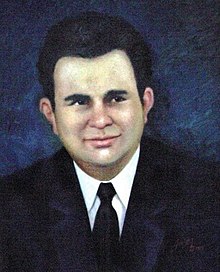
Back لويس سوموزا ديبايل Arabic لويس سوموزا ديبايل ARZ লুইস সোমোসা দেবাইলে Bengali/Bangla Luis Somoza Debayle German Luis Somoza Debayle Esperanto Luis Somoza Debayle Spanish Luis Somoza Debayle Estonian لوئیس سوموسا دوایله Persian Luis Somoza Debayle French Luis Somoza Debayle ID
Luis Somoza Debayle | |
|---|---|
 Somoza Debayle in 1962 | |
| 50th President of Nicaragua | |
| In office 3 February 1957 – 1 May 1963 Acting: 29 September 1956 – 3 February 1957 | |
| Vice President | Vacant |
| Preceded by | Anastasio Somoza García |
| Succeeded by | René Schick |
| Personal details | |
| Born | 18 November 1922 León, Nicaragua |
| Died | 13 April 1967 (aged 44) Managua, Nicaragua |
| Political party | Nationalist Liberal Party (PLN) |
| Spouse | |
| Children | 7 |
| Parents |
|
Luis Anastasio Somoza Debayle (18 November 1922 – 13 April 1967) was the 50th President of Nicaragua from 1957 until his resignation in 1963.[1] He succeeded to the presidency following the death of his father, Anastasio Somoza García. His family which was called the Somoza family was the most powerful family in the country at that time.
Somoza Debayle was born in León on 18 November 1922. In 1936 at the age of 14, he and his younger brother Anastasio attended Saint Leo College Prep near Tampa, before transferring to La Salle Military Academy on Long Island.[2] Luis was then educated at Louisiana State University, where he was a member of Fi Sigma Alfa Hispanic fraternity.[3] He married Costa Rican Isabel Urcuyo on 9 June 1947, and they had seven children together.[4][5]
Following the assassination of his father, Anastasio Somoza García, Luis was tapped as acting president, and was elected president in his own right the following year. His rule was somewhat milder than that of his father. However, civil liberties remained restricted, and corruption remained widespread.
His brother, Anastasio Somoza Debayle, headed the National Guard and was the second most powerful man in the country during his older brother's rule. Although Luis declined to run for reelection in 1963, he and Anastasio saw to it that the presidency was held from 1963 onward by politicians loyal to the Somozas. As a result, Luis remained the de facto leader of Nicaragua until his death in 1967, when he suffered a massive heart attack in Managua at the age of 44.
Luis Somoza was the president of the lower chamber of National Congress of Nicaragua from 1950 to 1953, and 1954 to 1956,[6][7] and the president of the Senate from 1965 to 1966.[8]
Under Luis Somoza's regime, Nicaragua played a key role leading to the creation of the Central American Common Market, with the Alliance for Progress backing that common market's creation. During the Bay of Pigs Invasion, he allowed the CIA-trained Cuban rebels to embark from Puerto Cabezas, on Nicaragua's Caribbean coast. The Sandinistas began their struggle against the government in 1961 – a struggle that would oust his brother in 1979.
- ^ "Gobernantes de Nicaragua". Ministerio de Educación. 9 December 2012. Archived from the original on 9 October 2012.
- ^ Horgan, James J. (1990). Pioneer College: The Centennial History of Saint Leo College, Saint Leo Abbey, and Holy Name Priory. Saint Leo College Press. p 464
- ^ "Capitulo Eterno". fisigmaalfa.org. Archived from the original on 15 April 2008. Retrieved 12 February 2008.
- ^ "Nicaraguan President Educated in the U.S." The Paducah Sun. UPI. 3 June 1959. p. 17. Retrieved 21 January 2020 – via Newspapers.com.
- ^ "She's Mrs. Santa to the whole city". St. Louis Globe-Democrat. Managua. 25 December 1959. p. 43. Retrieved 21 January 2020 – via Newspapers.com.
- ^ "(DELEGASE EN EL PODER EJECUTIVO LAS FUNCIONES DE LEGISLAR MIENTRAS EL PODER LEGISLATIVO NO ESTÈ REUNIDO)". legislacion.asamblea.gob.ni.
- ^ "(CRÉASE UN NUEVO JUZGADO PARA EL DISTRITO JUDICIAL DE MASAYA)". legislacion.asamblea.gob.ni.
- ^ "INSTALACIÓN DEL CONGRESO NACIONAL Y DE LAS CÁMARAS DE DIPUTADOS Y DEL SENADO". legislacion.asamblea.gob.ni.